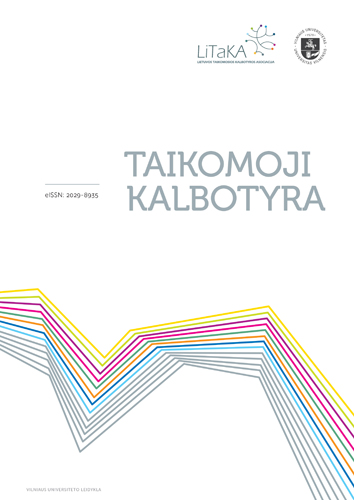Suaugusio lietuvio gimtosios kalbos žodyno dydis
Vocabulary size of an adult Lithuanian native speaker
Author(s): Krolina Andriuškevičiūtė, Loreta VilkienėSubject(s): Language studies, Applied Linguistics, Lexis, Sociolinguistics
Published by: Vilniaus Universiteto Leidykla
Keywords: vocabulary size; native language; the impact of sociolinguistic factors;
Summary/Abstract: This paper aims to answer the question about the vocabulary size of an adult native speaker of the Lithuanian language and to check which sociolinguistic factors have a significant impact on the size of the vocabulary. The material for this study consists of 132 responses given to a sociolinguistic survey and a vocabulary size test. The data was analysed using the statistical RStudio program. T-test and regression analysis were also applied in the research. Participants of the study were divided into two age groups (the younger and the older) as the adult age range is very broad. In total, the younger group consisted of 68 participants: 31 females and 37 males.The average age of this group is about 22. The older group consisted of 64 participants: 30 females and 34 males. The average age of this group is about 49.The study has revealed that the vocabulary of a younger native speaker (about 22 years old) is about 57,490 words and that the vocabulary size varies between 42,021 and 72,703 words. It has been found that the vocabulary of an older native speaker (about 49 years old) is about 60,770 and that the vocabulary size varies between 46,690 and 76,705 words. Regression analysis data shows that such factors as education, knowledge of foreign languages and reading fiction have a significant impact on the size of vocabulary. The study has also revealed that the size of the vocabulary is significantly larger for participants with a Master’s degree. Furthermore, the vocabulary size is larger for those individuals who know several languages which may not necessarily share any vocabulary with the Lithuanian language. Regression analysis data also indicates that reading fiction can significantly influence the size of vocabulary and that the vocabulary is larger for those participants who read sometimes, often or daily. It must be noted that the sample of participants in this study is relatively small, so all the findings and insights need to be verified by expanding the study groups.
Journal: Taikomoji kalbotyra
- Issue Year: 2019
- Issue No: 12
- Page Range: 154-181
- Page Count: 28
- Language: Lithuanian

